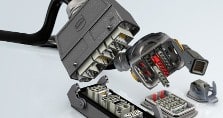Interfaces for the manufacturing systems of the future
Follow articleHow do you feel about this article? Help us to provide better content for you.
Thank you! Your feedback has been received.
There was a problem submitting your feedback, please try again later.
What do you think of this article?
Interfaces have been tasked with a key role in the evolution towards highly flexible production systems for Industrie 4.0. HARTING is offering scalable and therefore cost efficient interface solutions with new, implementable functionalities such as RFID and data storage.
Modularity, scalability and flexibility – these demands made on production systems are nothing new. But only since the dawn of Industrie 4.0 – with its decentralized, distributed intelligence and the production of tangible goods by modular, self-organizing systems controlled by work pieces these demands can actually be met.
This, however, is an evolutionary process for automation and mechanical engineering companies – current machinery must function within the existing environment while simultaneously being capable of migrating to Integrated Industry.
Machinery and modules with adaptive program code and flexible interfaces are emerging from manufacturing systems with non-changeable process sequences and rigid structures.
Interfaces have been tasked with a key role in this evolution towards adaptive, highly flexible production systems – communication interfaces, as well as interfaces between all machine elements and at all levels of production processes.
HARTING already offers the world's broadest product portfolio of scalable, and therefore cost efficient, pluggable interface solutions for power, control, signal and data connections, all featuring the company’s renowned outstanding technical functionality.
Specific examples of such scalable interfaces include:
• As a universal industrial interface for power, signal and data: the Han-Eco® family, which offers the option of using more than 50 different Han-Modular® modules or Han-Eco® monoblock inserts.
• As a universal communication interface: Ha-VIS preLink® installation technology, which combines the advantages of IT data network technology with the needs of industry and features a pre-assembled cable. The mating face can be precisely tailored to the respective end device or modified at a later point in time.
HARTING has expanded the functionality of the interfaces to meet the special requirements and the migration to Industrie 4.0. Highly available RFID systems enable the identification of all elements involved in the production process – work pieces, tools, machine modules etc., in addition to enabling flexible data storage directly on the elements or with reference to the element.
Machinery and modules with adaptive program code and flexible interfaces are emerging from manufacturing systems with non-changeable process sequences and rigid structures.
In addition, data storage directly in the industrial connector is also optional thanks to Han® ID modules, which are mechanically constructed so that they can be assembled into modular connectors directly alongside other power, data and signal modules. On the control side, Han® ID modules communicate directly with machine controllers (PLCs, industrial PCs) via industrial bus systems or discrete I/O. This results in the very cost-effective and flexible of data storage option that is also highly robust and at the “machine level” – with all of the ensuing benefits this offers.
These features permit the harmonious migration of the interfaces as a prerequisite for the successful evolution towards the highly flexible manufacturing systems of the future.



